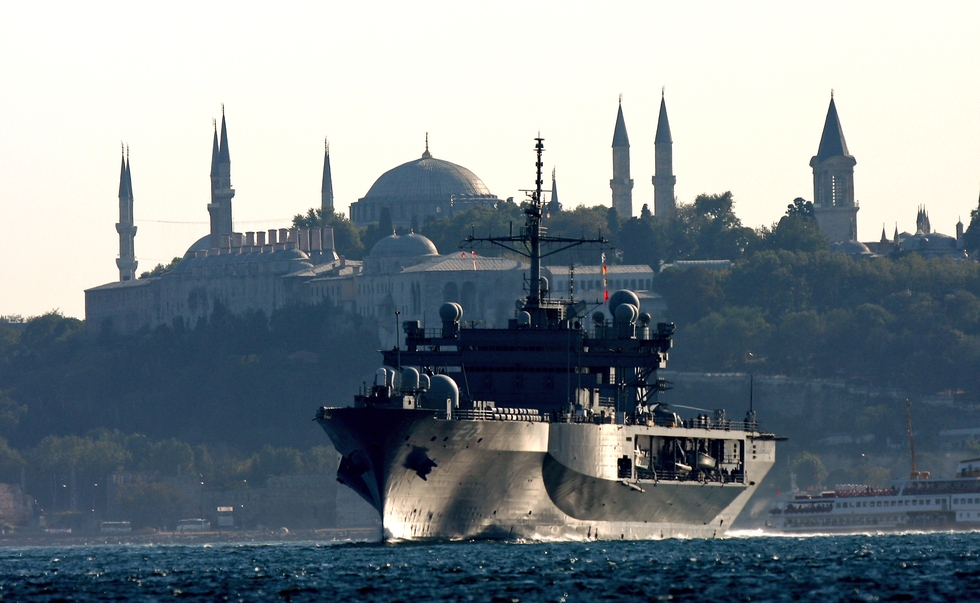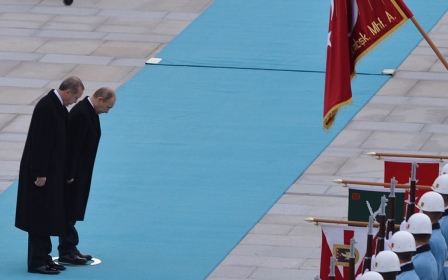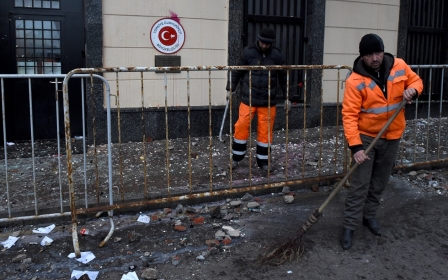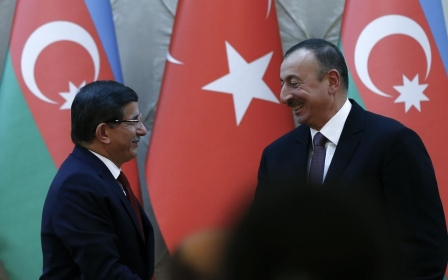Dire straits: Russia's need for Turkish waterways in the balance

It was an unmistakably insulting and hostile public gesture at a time of badly strained international relations between Russia and Turkey.
On 4 December, a Russian soldier on board a Russian warship passing through Istanbul’s Bosphorus Straits, stood on the deck flaunting a shoulder-fired surface-air-missile in the firing position, evidently fully aware that the world’s media were filming him.
There was promptly a fierce outcry in the Turkish media and a day later, the Russian ambassador in Ankara was summoned to the Turkish Foreign Ministry for a warning that the incident must not be repeated.
Perhaps the show of weaponry was intended only for domestic consumption by the Russian public. A Turkish naval commentator wrote that “the show with the single Sa-18 was neither funny nor logical”.
To the eyes of the rest of the world the photographs of the soldier and his missile launcher may have helped confirmed Turkish claims that it was repeated provocations from Russia that led to the shooting down of a Russia Su-24 fighter jet on 24 November for infringing its airspace.
That event brought to an abrupt end half a century of co-operative neighbourly co-existence between the two countries and led to mutual economic sanctions and restrictions on visas and travel, as well as to Turkish fears (so far unfounded) of possible Russian interference with its energy exports to Turkey.
The incident also revived questions about the international status of the Turkish Straits and whether they give Turkey any practical leverage over Russia in the present dispute or whether attempts to do so could turn them into a new international flashpoint.
Ironically, an international summit is being held in Istanbul between 9 and 11 December to promote cooperation over the waterway with several cabinet ministers due to attend. However Turkey seems not to be using it to make any political points other than the need for humanitarian help to the people of Syria.
However the Bosphorus remains potentially a major element in the Turkish-Russian confrontation, comparable to historical disputes over the Suez and Panama canals.
The present arrangements in the Turkish Straits reflect decades of deliberate self-restraint by Turkey and Russia in their common interest. Rights of passage through the 68km Dardanelles at Canakkale, then the small sea of Marmara, and finally and most crucially, the 19km of the Bosphorus are regulated by the 1936 Montreux Convention, drafted and agreed by 11 countries.
There were no pressing international conflicts at that date and only one or two commercial vessels passed through Istanbul each day. Though the agreement can be reviewed every 20 years (the next such review being due in 2016), its terms basically operate in perpetuity. Turkey has no powers to block merchant vessels or make them pay for their transit and can only close the waters to the warships of hostile countries in time of war.
Warships from countries outside the Black Sea are allowed only to send in warships smaller than 15,000 tons – a restriction which prevents the US navy operating in the Black Sea and which the administration of President George W Bush lobbied unsuccessfully to scrap in 2006-2007.
Turkey in 1976 eased the restrictions on large Russian warships by allowing the Kiev, an aircraft carrier, to pass through the Straits if it was described as a cruiser. The Straits are thus a key element in Russian strategy both for naval operations in the Atlantic and for its current operations in Syria.
Today the Bosphorus and Sea of Marmara are clogged with vessels over which Turkey has no direct control. Collisions and spillages occur periodically and the situation is very unpopular with Istanbul’s 18 million inhabitants who yearn to have the waterways free to themselves.
As a result in 2011, President Erdogan, then Turkey’s prime minister, proposed creating a giant canal - "Kanal Istanbul" - across the peninsula behind Istanbul to enable international shipping to bypass the city. Though some infrastructural work has started, this idea, whose cost was estimated at $10 billion in 2011 but would probably be much higher in reality, remains a distant dream. It would raise acute environmental issues, as well as requiring international agreement over the rights of warships and possible transit fees.
Conscious that the balance is a delicate one - the stakes in a confrontation with Russia over this vital artery would be very high indeed - and that on the whole Turkey gains from Montreux, successive Turkish governments have resisted calls from their own public for changes.
The present Ankara government is equally reluctant to engage in sabre brandishing over the Straits. Russia argues that Turkey has no power to discriminate only against Russian vessels without putting itself in a "state of war".
That last point is the nub of the question. Turkey - and its NATO allies - cannot safely risk a full-scale confrontation over the Straits. However if Russia suspends or reduces sits energy supplies to Turkey and thus breaks legally binding long-term agreements, Turkey may argue that the legal situation over the Straits could also unwind.
In the meantime, Turkey can deploy relatively minor irritants to make life uncomfortable for Russian vessels going through the Bosphorus. According to some claims, it has indeed already begun to do so by keeping Russian ships waiting for hours, though this situation, reported at the beginning of the month, does not seem to be continuing.
- David Barchard has worked in Turkey as a journalist, consultant, and university teacher. He writes regularly on Turkish society, politics, and history, and is currently finishing a book on the Ottoman Empire in the 19th century.
The views expressed in this article belong to the author and do not necessarily reflect the editorial policy of Middle East Eye.
Photo: The USS Mount Whitney destroyer cruises in the Bosporus strait on 3 September, 2008 in Istanbul (AFP).
Stay informed with MEE's newsletters
Sign up to get the latest alerts, insights and analysis, starting with Turkey Unpacked
Middle East Eye delivers independent and unrivalled coverage and analysis of the Middle East, North Africa and beyond. To learn more about republishing this content and the associated fees, please fill out this form. More about MEE can be found here.





